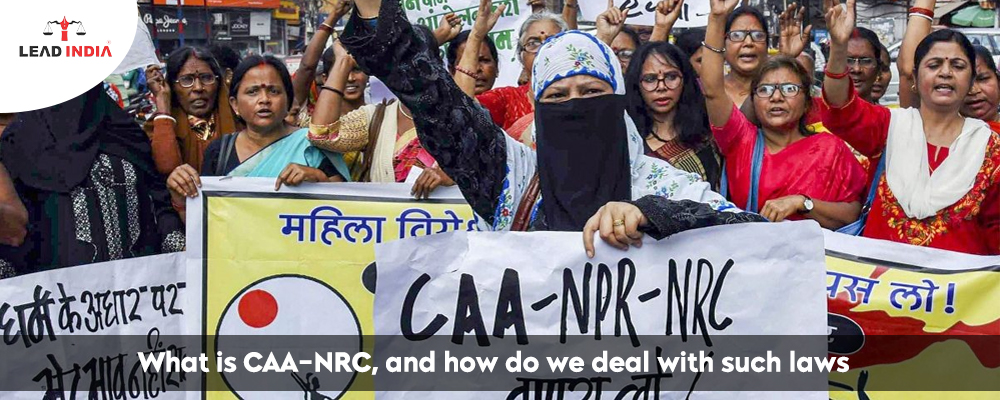The CAA was approved to confer Indian citizenship to unauthorized immigrants who entered India on or before December 31, 2014. The Act was enacted for the immigration of six different religions from Afghanistan, Bangladesh, and Pakistan, including Hindus, Sikhs, Buddhists, Jains, Parsis, and Christians. Any individual who has resided in India for the last 12 months and 11 of the previous 14 years is considered eligible for this statute. The number of years of residency for a specific group of undocumented immigrants has been reduced from 11 to five.
What is NRC
The National Register of Citizens, 1951, is a register established following the 1951 Census in respect of each village, showing the houses or holdings in a serial sequence and noting the number and names of people who live there. The NRC appeared only once, in 1951.
Need A Legal Advice
The internet is not a lawyer and neither are you. Talk to a real lawyer about your legal issue

Issue related to CAA-NRC
- The government claims that minority groups covered by the CAA have escaped persecution in Muslim-majority countries. However, some criticize the logic’s coherence, citing the exclusion of specific religious minorities and neighboring countries dealing with comparable issues.
- While the CAA does not apply to regions listed on the sixth schedule of the Constitution or states with inner-line permit systems, Assam has seen particularly strong criticism. Fears linger that regularising illegal Bengali Hindu immigration from Bangladesh under the CAA will endanger the state’s cultural and linguistic fabric.
- Unlike the National Register of Citizens (NRC), which focuses on identifying illegal immigrants regardless of religion, the CAA has been criticized for allegedly discriminating against Muslims, thereby violating the fundamental right to equality guaranteed by Article 14 of the Constitution. Despite the opposition’s concerns, the administration stands firm on the CAA’s constitutionality and fairness.
Features of CAA-NRC
- The Act attempts to alter the Citizenship Act of 1955 to allow undocumented Hindu, Sikh, Buddhist, Jain, Parsi, and Christian immigrants from Afghanistan, Bangladesh, and Pakistan eligible for Indian citizenship. In other words, the Act aims to make it simpler for persecuted persons from adjacent countries to become Indian citizens.
- The amendment reduces the naturalization requirement from 11 to 5 years as a special condition for candidates belonging to these six religions.
- The citizenship application deadline is December 31, 2014, which means the candidate must have entered India on or before that date.
- According to the Act, those who acquire citizenship in India are considered citizens from the moment they enter the country. Any legal actions related to their illegal migration or citizenship are closed.
- It also states that those with Overseas Citizen of India (OCI) cards, which allow a foreign citizen of Indian ancestry to live and work in India permanently, may lose their status if they breach local laws for significant or small offenses and transgressions.
How to deal with CAA-NRC
- To deal with such laws, it is important to raise awareness about the emerging issues regarding the law. Awareness should be made amongst family, and friends and try to convince them to oppose the law
- Use social media to raise your voice and put your opinion about the new law.
- You can contribute and participate in the organizations working against the said law.
- Try to convince the state government to oppose the law. You can even challenge the law in the Supreme Court.
- Participate in the protest against the CAA-NRC and raise your voice.
- You can even engage in non-cooperation with the NRC process if required.
Lead India offers various legal services, such as free legal advice and internet information. We provide a facility in which you can talk to a lawyer and ask legal questions regarding the law here. Lead India’s lawyers can assist you with any legal issues. In India, Lead India provides free legal assistance online. In addition to receiving free legal advice online, Lead India allows users to pose inquiries to experts for free.





 Talk to a Lawyer
Talk to a Lawyer